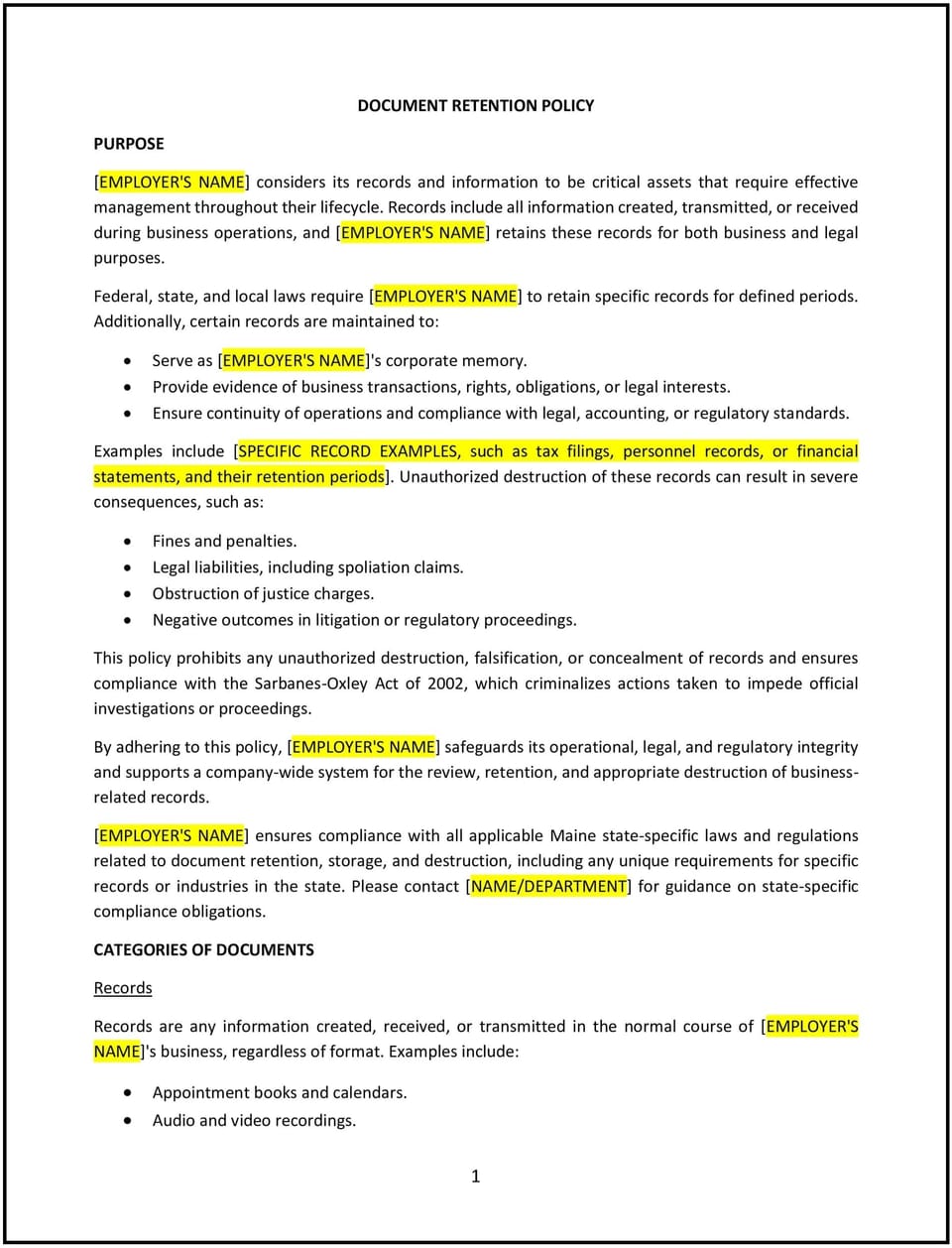Document retention policy (Maine): Free template

Document retention policy (Maine): Free template
This document retention policy is designed to help Maine businesses manage the storage, maintenance, and disposal of records in compliance with state and federal laws. It outlines clear guidelines for retaining essential documents, ensuring efficient record-keeping, and safeguarding sensitive information while promoting operational efficiency.
By implementing this policy, Maine businesses can streamline document management, minimize legal risks, and maintain compliance with regulatory requirements.
How to use this document retention policy (Maine)
- Define document categories: Specify the types of records covered under the policy, such as financial documents, employee records, contracts, and client information.
- Establish retention periods: Detail the required timeframes for retaining each category of document, based on legal, tax, or business requirements.
- Outline storage procedures: Include guidelines for securely storing physical and electronic documents to prevent unauthorized access or loss.
- Detail destruction processes: Provide steps for safely disposing of records that have exceeded their retention periods, such as shredding or secure digital deletion.
- Assign responsibilities: Identify who is responsible for managing, auditing, and enforcing document retention practices.
- Include compliance considerations: Ensure the policy adheres to Maine laws and applicable federal regulations.
- Review regularly: Update the policy to reflect changes in legal requirements or business practices.
Benefits of using this document retention policy (Maine)
Implementing this policy provides several benefits for Maine businesses:
- Ensures compliance: Aligns with legal and regulatory requirements for record-keeping.
- Minimizes risks: Reduces exposure to legal or financial penalties due to improper document handling.
- Enhances efficiency: Streamlines document storage and retrieval processes, improving operational workflows.
- Protects sensitive information: Safeguards confidential records from unauthorized access or data breaches.
- Reduces clutter: Eliminates outdated records, creating a more organized and manageable storage system.
Tips for using this document retention policy (Maine)
- Train employees: Provide training on proper record-keeping and disposal procedures.
- Use technology: Implement digital tools or software to manage and automate document retention schedules.
- Maintain logs: Keep detailed records of document destruction activities to demonstrate compliance.
- Audit regularly: Conduct periodic audits to ensure records are being retained and disposed of according to the policy.
- Communicate expectations: Share the policy with employees during onboarding and include it in the employee handbook.
- Stay updated: Monitor changes in Maine and federal record-keeping laws to ensure ongoing compliance.
Q: What types of documents should businesses retain under this policy?
A: Businesses should retain documents such as financial records, employee files, tax documents, contracts, and client records, as specified by legal and operational requirements.
Q: How long should businesses retain records?
A: Retention periods vary depending on the document type; for example, tax records may need to be kept for seven years, while some employment records may require longer retention.
Q: How can businesses securely dispose of outdated records?
A: Businesses should use methods like shredding physical documents or permanently deleting electronic files using secure software.
Q: How often should businesses review their document retention policy?
A: Businesses should review the policy annually or whenever there are updates to Maine or federal record-keeping laws.
Q: What role do employees play in document retention?
A: Employees are responsible for following storage, retention, and disposal procedures as outlined in the policy.
Q: How can businesses protect sensitive information during document storage?
A: Businesses should use secure storage solutions, implement access controls, and encrypt digital files to safeguard sensitive information.
Q: What should businesses do if they are audited or subject to a legal inquiry?
A: Businesses should ensure relevant records are readily accessible and consult legal counsel to comply with audit or inquiry requirements.
This article contains general legal information and does not contain legal advice. Cobrief is not a law firm or a substitute for an attorney or law firm. The law is complex and changes often. For legal advice, please ask a lawyer.


